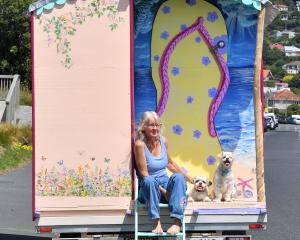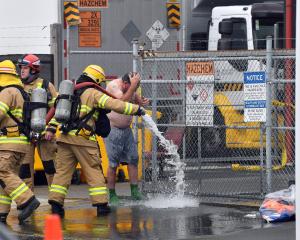Men's sheds have always been a feature of the Kiwi garden. But now communal sheds popping up in town centres are as much about socialising as solitude. Kim Dungey peeks inside.
Their wives think they're working but the power tools are silent.
The six men gathered in the South Dunedin Blokes' Shed are too busy sorting out the world's problems.
Politicians are a favourite subject at this hour-long "extended morning smoko".
Around the walls of the former King's High School tractor shed, shelves hold neatly labelled ice-cream containers with washers, split pins and self-tapping screws.
But it's an odd scene.
Alongside the thicknesser, compressor and bandsaw are touches of domesticity: a white cloth on the table, a red fridge that one of their wives wanted out of the garage, and a pink Barbie clock that no-one is admitting to owning.
The men (average age 69), will eventually replace the lid on the biscuit tin and do some work. In the past three years, they have built raised gardens for kindergartens, pamphlet-holders for Age Concern, sheep shelters and tiered seating for the SPCA and a footbridge for a school playground.
But there is no hurry.
"This is the most important part of the day," says John Hesketh, a former navy engineer who arrives about 8.30am to switch on the Zip water heater.
"My wife is doing housework by then and wants me out of the house."
Around the country, blokes are bonding in New Age garden sheds that have moved from the backyard into the community.
So far, there are more than 40, including ones in Mosgiel, Wanaka, Alexandra and Oamaru. Others are planned for Northeast Valley and Port Chalmers. A national conference will be held next month.
There's a school of thought that sheds are places where men "do nothing except swap yarns, compare scars, talk about their prostates, fart loudly and tell lies".
But some say they also serve a serious purpose - helping older men to feel productive, valuable to their communities, connected to friends and active in both mind and body.
Designed for personal or community projects, these modern men's sheds typically have a minimal membership fee (of $10 or $20) and are open two days a week.
"When guys retire, they're out of the community. There's nowhere for them to congregate," explains Matt Ryan, a former coach builder turned entertainer. "In days gone by, they would probably go to the pub and socialise there as they'd done all their working lives. Now, with drink-driving [awareness], there's less focus on the pub culture.
"Lots of men only last 18 months [after retirement] and then pass away. For me, it's the fact they've become inactive and are no longer needed by the community ... Somewhere like this gives them somewhere to go on a regular basis and to utilise their skills while working for the community."
At this, the Glasgow native - teased mercilessly for his broad accent - is instantly nominated as the group's spokesman.
The men here have spent their lives tinkering. Renovating houses, repairing furniture, fitting their own kitchens.
Many learned by watching fellow tradesmen and completing hands-on work during apprenticeships. Written instructions are consulted only "when in doubt or when all else fails".
But the group says there are so many regulations today, it is difficult for people to embrace the DIY tradition. And increasing technology means practical skills are being lost. If young people can't do a job with a machine, they don't know how, Ryan says, and if something breaks, they simply replace it.
"We're kind of dinosaurs by comparison."
Busy parents with no time for projects at their local school or kindergarten appreciate the men's work and the group has also had help in the form of grants and donated tools, Hesketh adds.
"The beauty of it is we've got the backing of places like the Dunedin City Council, the navy, Age Concern, the Methodist Mission and St John. They can all see the value in it. At one stage, one of the professors in the mental-health side of the university was even looking at doing a study ..."
Across the Tasman, where there are more than 650 sheds used by 125,000 people, the Australian Men's Shed Association receives funding from the Australian Government. A major objective has been advancing the health of the male members, who are often more reluctant than women to go to a doctor.
The association's motto is that men don't talk face-to-face but shoulder-to-shoulder, and that resonates with Bob Biggart, who helped found the Taieri Blokes' Shed in 2008 and the South Dunedin shed the following year.
"A few of us have had our ups and downs [health-wise] so we acknowledge one another's shortfalls, so to speak, and make sure everybody looks after one another," he says. At other times the conversation turns to "who's been where and how the whitebait are going to run".
Despite such health concerns, it's still a surprise to find a coffin at the former NAC hangar where the Taieri men meet.
Jim Doolan, a former hydro construction worker, searched Google and downloaded nine pages of instructions after a member of the public asked the group's chairman if they could build one.
"It's for an elderly woman who reckons she's going to live till 100. I think at the moment she's in her 80s."
While most seeing the box have a giggle and break into "Hail Marys", Doolan recalls that the assignment almost went pear-shaped when he and the chairman - tape measure in hand - went to visit the "client".
"This old, frail lady answered the door and we thought yep, we're in the right place. We were trying to convince her that we were the blokes from the shed and she needed us. We didn't mention this thing," he says, motioning towards the half-finished Customwood casket.
"She was in complete denial and we thought the poor old soul had probably lost her marbles.
"Then this lady from two or three doors along came and said: 'You must be looking for me'. It was quite embarrassing ..."
Chairman Ian Miller adds the job is a "one-off" and the Taieri men, like those in South Dunedin, are careful not to encroach on the work done by commercial businesses.
Other projects have included walkways for Orokonui Ecosanctuary, lanterns for Naseby and planter boxes for the main street of Mosgiel.
Like him, some of the men are retired farmers who have moved into town and lost their workshops in the process.
"This is one of the few sheds that is growing as quickly as it is. There's about 40 members and that's doubled in the last year and a-half."
The Alexandra Men's Shed finally opened at Molyneux Park at the end of March, after four years of negotiations. Members have been meeting since last August, helping groups build floats for the blossom festival, repairing toys for local organisations and making an information stand for the town's new community house.
However, the Wanaka Blokes' Shed has not been as active and the organisers wonder if it is because the main focus has been their own projects, rather than community work.
Businessman John Walker, who started Oamaru's Community Workshop, has been a "shedaholic" since the age of 6 when his father began teaching him how to use a handsaw, a chisel and a plane. Such skills are not always passed between the generations now but local members hope to tutor students and anyone else who wants to learn, he says.
At present, they are converting a 9.8m fishing vessel into a playground sailing ship for Friendly Bay.
One thing the sheddies have in common is a dislike of bureaucracy. The only real rule is that they cannot work alone in case they have an accident. And most in the South have avoided joining the national organisation, Menz Sheds Aotearoa, which is part of an international association.
"That's north of the Waitaki," Biggart says. "We don't consider that we need international recognition ... These guys have all been on more committees than you can shake a stick at and they don't want to know about them. They'd sooner get on with what needs to be done without too much pussyfooting around."
More controversial is the issue of whether women should be allowed inside the sheds' humble walls.
The South Dunedin group has a few "honorary blokes", including a widow who wanted to learn how to use her late husband's tools, and the group planning a Port Chalmers shed includes six females. But the Alexandra men are reluctant to admit women, after one attended an open day and pointed out everything they had done wrong. This included leaving planes sitting upright instead of on their sides.
Neil Bruce, convener of next month's conference, counters claims of sexism by saying most sheds welcome women in some way and are not "exclusive man-caves" as some believe.
Canterbury Men's Sheds Co-ordinator Martin Cox says although the sheds there are primarily for men, the members are keen to share their skills with women in much the same way as many women have shown men how to cook and bake.
Some are planning women-only days and others want to hold family days for their children, grandchildren and wives.
Both men believe sheds should be funded by the Government.
Studies have shown that sheds address the social isolation many men face once they retire and there is reduced suicide and depression among regular attenders, says Cox, whose work is funded by the Catholic Social Justice Agency, Caritas.
The sheds have also been a "great relief" for many men after the Canterbury earthquakes.
"My expectation of some of the older blokes ... was that they'd be fairly sedentary, wouldn't have a heck of a lot to say and would be a bit set in their ways. But they're really dynamic. They feed off each other and really get into it."
He believes funding could be provided from the health vote or the Ministry of Social Development and says John Key already knows about men's sheds from Julia Gillard, whose partner is a patron of the Australian Men's Sheds Association.
Back in South Dunedin, Dave Ryder empties a jar of cup hooks on to the bench and says they are the sort of thing a handyman can never find when he needs to.
Then he has to buy four when he requires only one.
It's a droll humour shared by sheddies online. There, devotees describe the typical shed as dilapidated and full of useless items, with a very small window with pre-installed grime to reduce light ingress to a minimum, extra four-inch nails on the studs to improve hanging capacity and downwardly adjustable headroom to ensure that no owner shall be able to stand fully upright.
These "Sheddi Knights" even have their own vocabulary, which includes "sheditation" (the preferred in-shed activity), "nottage" (the collective name for things you find a use for immediately after you've thrown them away) and "exeter" (the small component you find after you have just mended a fuse, changed a bulb or fixed a blender and which means you have to undo everything and start over again).
"In general, any word which might imply parting with money or 'achieving closure' of some project or un-disarranging things, may cause a shedder distress and should be avoided."
But Matt Ryan is adamant that every man needs a shed. At least, every man who knows what he is doing inside one: "If you've grown up with practical skills, that's your gift (A) from God and (B) to the community."
Like most of the South Dunedin group, he has his own shed and projects waiting at home but prefers to be here.
"There's nobody to take the mickey out of at home," Hesketh agrees with a grin. "If I take the mickey out of the wife, she gets upset."
More info
For more information, contact the following:
South Dunedin: John Hesketh, 470-1967 or Dave Ryder, 455-9336
Taieri: Ian Miller, 489-3666
Alexandra: Neil McArthur, 03 448-9377
Oamaru: John Walker, 03 434-5987
Wanaka: Tom Lynch, 03 443-7877












